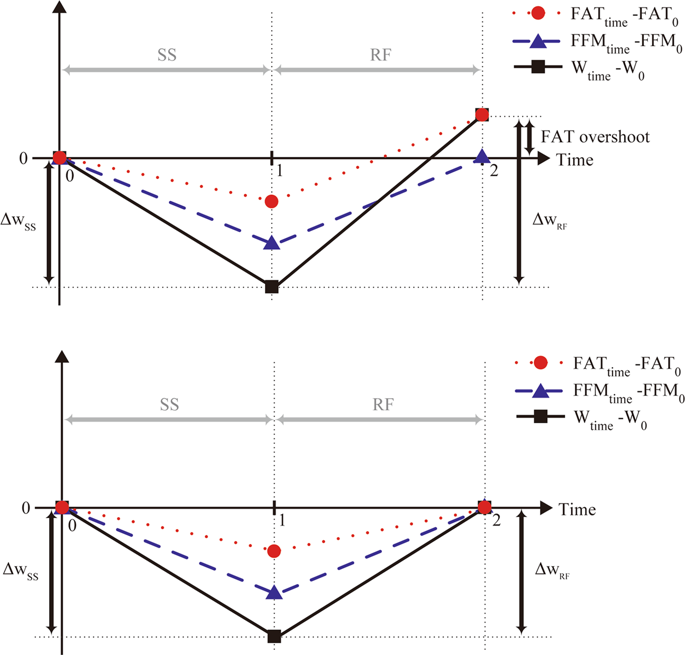当前位置:
X-MOL 学术
›
Int. J. Obesity
›
论文详情
Our official English website, www.x-mol.net, welcomes your
feedback! (Note: you will need to create a separate account there.)
How dieting might make some fatter: modeling weight cycling toward obesity from a perspective of body composition autoregulation.
International Journal of Obesity ( IF 4.2 ) Pub Date : 2020-02-25 , DOI: 10.1038/s41366-020-0547-1 Philippe Jacquet 1, 2 , Yves Schutz 1 , Jean-Pierre Montani 1 , Abdul Dulloo 1
International Journal of Obesity ( IF 4.2 ) Pub Date : 2020-02-25 , DOI: 10.1038/s41366-020-0547-1 Philippe Jacquet 1, 2 , Yves Schutz 1 , Jean-Pierre Montani 1 , Abdul Dulloo 1
Affiliation

|
The notion that dieting makes some people fatter has in the past decade gained considerable interest from both epidemiological predictions and biological plausibility. Several large-scale prospective studies have suggested that dieting to lose weight is associated with future weight gain and obesity, with such predictions being stronger and more consistent among dieters who are in the normal range of body weight rather than in those with obesity. Furthermore, the biological plausibility that dieting predisposes people who are lean (rather than those with overweight or obesity) to regain more body fat than what had been lost (referred to as fat overshooting) has recently gained support from a re-analysis of data on body composition during weight loss and subsequent weight recovery from the classic longitudinal Minnesota Starvation Experiment. These have revealed an inverse exponential relationship between the amount of fat overshot and initial adiposity, and have suggested that a temporal desynchronization in the recoveries of fat and lean tissues, in turn residing in differences in lean-fat partitioning during weight loss vs. during weight recovery (with fat recovery faster than lean tissue recovery) is a cardinal feature of fat overshooting. Within a conceptual framework that integrates the relationship between post-dieting fat overshooting with initial adiposity, the extent of weight loss and the differential lean-fat partitioning during weight loss vs. weight recovery, we describe here a mathematical model of weight cycling to predict the excess fat that could be gained through repeated dieting and multiple weight cycles from a standpoint of body composition autoregulation.
中文翻译:

节食如何使人更胖:从身体成分自动调节的角度模拟体重向肥胖的循环。
在过去的十年中,节食会使某些人变胖的概念从流行病学预测和生物学合理性中引起了相当大的兴趣。几项大规模的前瞻性研究表明,通过节食减肥与未来的体重增加和肥胖有关,这种预测在体重正常范围内的节食者中比在肥胖者中更强烈和更一致。此外,节食使瘦人(而不是超重或肥胖的人)容易恢复比失去的脂肪(称为脂肪过量)更多的身体脂肪的生物学合理性最近得到了重新分析数据的支持来自经典纵向明尼苏达饥饿实验的体重减轻和随后体重恢复期间的身体成分。这些揭示了脂肪溢出量和初始肥胖之间的反指数关系,并表明脂肪和瘦肉组织恢复的时间不同步,反过来又存在于减肥期间与体重期间瘦脂肪分配的差异恢复(脂肪恢复比瘦肉组织恢复快)是脂肪超调的一个主要特征。在将节食后脂肪超调与初始肥胖、体重减轻程度和体重减轻与体重恢复期间瘦肉脂肪分配差异之间的关系相结合的概念框架内,我们在此描述了一个体重循环的数学模型,以预测从身体成分自动调节的角度来看,可以通过反复节食和多次体重循环获得的多余脂肪。
更新日期:2020-02-25
中文翻译:

节食如何使人更胖:从身体成分自动调节的角度模拟体重向肥胖的循环。
在过去的十年中,节食会使某些人变胖的概念从流行病学预测和生物学合理性中引起了相当大的兴趣。几项大规模的前瞻性研究表明,通过节食减肥与未来的体重增加和肥胖有关,这种预测在体重正常范围内的节食者中比在肥胖者中更强烈和更一致。此外,节食使瘦人(而不是超重或肥胖的人)容易恢复比失去的脂肪(称为脂肪过量)更多的身体脂肪的生物学合理性最近得到了重新分析数据的支持来自经典纵向明尼苏达饥饿实验的体重减轻和随后体重恢复期间的身体成分。这些揭示了脂肪溢出量和初始肥胖之间的反指数关系,并表明脂肪和瘦肉组织恢复的时间不同步,反过来又存在于减肥期间与体重期间瘦脂肪分配的差异恢复(脂肪恢复比瘦肉组织恢复快)是脂肪超调的一个主要特征。在将节食后脂肪超调与初始肥胖、体重减轻程度和体重减轻与体重恢复期间瘦肉脂肪分配差异之间的关系相结合的概念框架内,我们在此描述了一个体重循环的数学模型,以预测从身体成分自动调节的角度来看,可以通过反复节食和多次体重循环获得的多余脂肪。










































 京公网安备 11010802027423号
京公网安备 11010802027423号